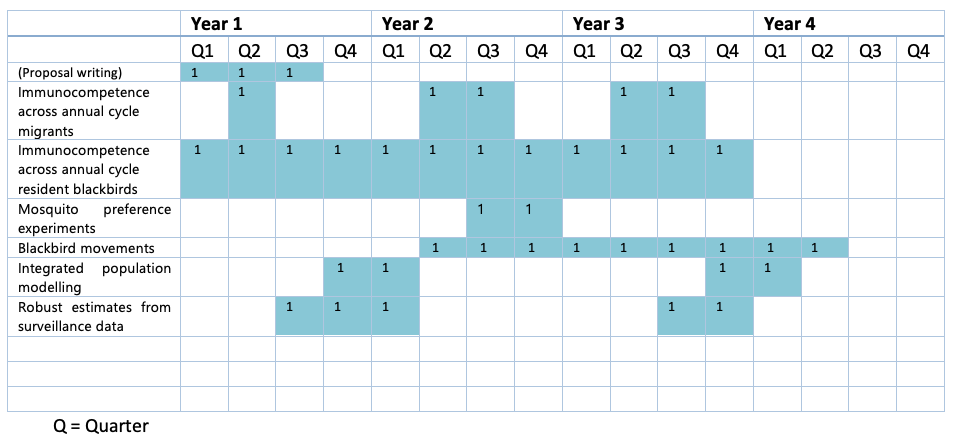Tjomme
van Mastrigt

Project
Tags
Promotor
Fred de Boer
Co-promoter(s)
Henk van der Jeugd; Kevin Matson
Institute(s)
Center for Avian Migration and Demography – Netherlands Institute of Ecology (NIOO-KNAW)
Description PhD project
Last decades, Europe has witnessed (re-)emergence of multiple zoonotic mosquito-borne viruses for which bird populations act as important reservoirs. Whereas population-level effects on birds during arbovirus outbreaks are well described, the underlying individual-level dynamics (e.g. movement, immunity, mortality) and the interactions between virus, vector and host that drive population-level effects have received less attention. Prevalence of arboviruses is heterogeneous in space, time and across avian taxa. This heterogeneity in transmission results partly from feeding preferences and biting rates of mosquitoes across a range of avian taxa. Yet, we know very little about the feeding habits of European mosquitoes with respect to avian hosts, their densities and differences in attractiveness. In addition, individual bird-level predictors of survival and seroconversion probabilities (e.g. sex, age, migratory status) have not been identified, whereas these affect key parameters in predicting arbovirus transmission and spread. Moreover, while bird movements link locations across a range of spatial scales, the role of fine-scale bird movement patterns in disease spread has received little attention. At the same time, migratory birds are often suggested to introduce sub-Saharan arboviruses into European resident bird populations. While these long-distance movements by birds link otherwise isolated locations, little is known about immune regulation during and after physiologically strenuous long-distance flights and the scope this process leaves for arbovirus introductions. Gaining insight in avian disease introductions, mosquito-bird interactions and individual survival and seroconversion probabilities of wild birds will greatly improve our understanding of heterogeneity in arbovirus transmission and the role birds play in pathogen spread.
Research questions / objectives
- Quantify the impact of the emergence of USUV on wild bird population dynamics in the Netherlands
- Test for individual-level predictors of mortality in wild blackbirds
- Develop an integrated statistical framework in which robust and unbiased estimates of prevalence, antibody dynamics and bird survival consequences can be inferred from arbovirus surveillance data, with the USUV outbreak in blackbirds as a case study
- Compare different approaches in key epidemiological parameter estimates in wild bird populations from literature to identify sources of bias
- Develop an integrated population model of blackbirds, to estimate survival and fecundity consequences of USUV infection in the wild
- Characterize variation in avian immunocompetence across annual cycle stages for sub-Saharan migratory song birds
- Characterize immunocompetence in resident blackbirds in the Netherlands across annual cycle stages
- Characterize blackbird movements within the Netherlands (dispersal, ‘prospecting’, seasonal movements) within and between urban and natural (forest) habitats using GPS trackers and ringing data
- Quantify mosquito feeding preferences in experimental trials using offspring from urban and rural mosquito populations for urban and rural bird species with contrasting abundances in urban and rural habitat types
Timeline

Tags matching with the contents of track 3
Methods
-
Labwork
- PCR: Co-infection with avian malaria
- ELISA: Immunological assays will be using this technique.
- RNA/DNA extraction: Avian host genetic diversity may be linked to prevalence in the wild, and where possible through collaboration in infection trials.
- Virus neutralization: I will be using viral neutralization assays to identify patterns in migratory birds throughout the annual cycle.
- In vivo: Living birds in the wild will be studied by repeated sampling for arboviruses throughout the annual cycle. Mosquitoes will be studied in vivo to learn about mosquito feeding preferences in an experimental setting.
- In vitro: In vitro work will be done during immunological assays to challenge the immune system.
- Ex Vivo: Work will be done during immunological assays to challenge the immune system.
- Plaque Assay: Work will be done during immunological assays to challenge the immune system.
- Living mosquito experiment: Mosquitoes will be studied in vivo to learn about mosquito feeding preferences in an experimental setting.
- Living animal experiment: Behavioural studies will be done using GPS transmitters on wild birds to study their habitat use in urban and rural settings, and to characterize host movements that may be important in the spread of vector-borne diseases.
Fieldwork
- Mosquito trapping: Mosquitoes will be captured only for use in experimental settings. Different habitats will be chosen to compare feeding preferences of mosquitoes in a standardized environment.
- Habitat characterization: Bird nests will be collected and ectoparasite loads will be quantified to identify effects on the rearing environment on the immunocompetence of nestling birds.
- Bird trapping/sampling/surveillance: Wild birds will be caught on their breeding grounds as well as on stop-over locations during migrations to characterize annual cycle variation in immunocompetence and to link this to parasite pressure. Moreover, resident birds will be caught to study immune function in a natural context.
Citizen science
- Citizen science: Experienced and well-trained volunteer bird ringers will contribute to the arbovirus surveillance in wild bird populations throughout the Netherlands as well as abroad.
Modelling
- Species distribution: Spatial aspects in population dynamics may be taken into account when this turns out to be essential in population modelling of avian host dynamics.
- Epidemiological modelling: Transitions between infection states will be estimated from capture-mark recapture models, and will be incorporated in integrated approaches in collaboration with other PhD students.
- Ecological modelling: Survival and antibody dynamics will be studied in the context of capture-mark recapture studies of wild birds on ringing sites to build statistical models that allow multiple sources of non-randomly missing data and uncertainty to be taken into account in inference of demographic and epidemiological parameters.
Literature
- Literature review: A meta-analysis on the published prevalences will be used to quantify USUV and WNV prevalence across avian taxa, special attention will be paid to sources of bias arising from contrasting methodologies in published data.
Topics
-
Vector:
- Vector host-preference: Mosquito preferences for avian hosts will be quantified in experimental settings to identify whether vector population and host specific patterns in biting rate can be expected to play a role in the wild.
Host:
- Host abundance: Host abundance will be modelled in integrated population models during the Usutu outbreak in the Netherlands. Simulations may be used to explore scenarios.
- Host movement patterns: Avian movements will be quantified from existent ringing data sets, as well as from GPS logger data on wild birds in urban and natural habitat types.
- Host susceptibility: Susceptibility will be looked at in an integrated modelling approach of infection histories from wild avian hosts during and after an USUV outbreak. Individual-level predictors (e.g. sex and age) will be taken into account to explain these patterns.
- Host Seroprevalence: Survival and antibody dynamics will be studied in the context of capture-mark recapture studies of wild birds on ringing sites to build statistical models that allow multiple sources of non-randomly missing data and uncertainty to be taken into account in inference of demographic and epidemiological parameters.
Environmental:
- Climate: Prevalences in sub-Saharan migratory birds caught in the Netherlands will be linked to annual variation in precipitation on the wintering grounds, and possibly weather conditions along the migratory flyway will be taken into account when quantifying timing of arrival on the breeding grounds.
- Habitat type: Urban and natural habitat types will be compared in prevalences, and movements within and between these habitat types by key avian hosts will be characterized.
Virus:
- Virus-host interaction: Population-level effects and individual-level predictors of disease related mortality and infection with USUV will be studied using existent data sets and through collaborations.
Species
-
Species:
- Human: I will work on health education and promotion with students to raise awareness for arboviruses and virus prevention and preparedness.
- Mosquito: I will work on mosquito surveillance.
Virus
-
Virus:
- West Nile virus: When WNV will show up, this can be detected in the arbovirus surveillance that is already up and running for wild birds. When WNV is first detected, sampling strategies may be adapted to suit our needs and that of the consortium as a whole.
- Usutu Virus: Focus of my PhD using the arbovirus surveillance data we already collected will be the case of USUV in wild birds. Population level effects will be looked into by integrated population modelling and other approaches to estimating disease-related mortality and possibly, effects on bird fecundity.
- Tick-Borne Encephalitis Virus: Ticks are (and have been) collected from wild birds for a long time, and will be analysed to test for TBEV.